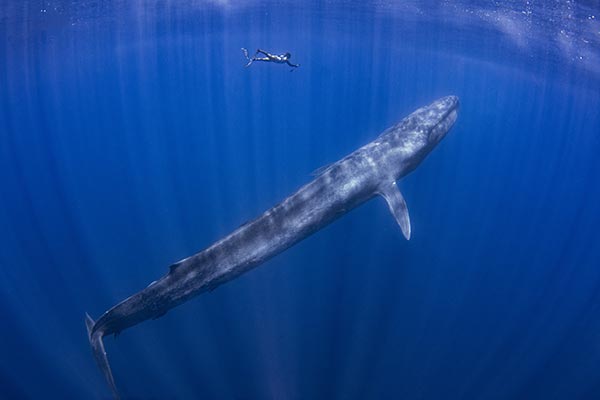Blue whales slow their heartbeat when diving: Study
03/26/2021 / By Joven Gray

Researchers from Stanford University have come up with the first-ever recording of the heartbeat of a blue whale. Using this, they’ve discovered that the gigantic mammals can slow down their heartbeat to only two per minute.
As detailed in the study published in the journal Proceedings of the National Academy of Sciences, the team attached four suction cups with a sensor tag near the whale’s left flipper. Electrodes in the suction cups recorded the heartbeat of the animal. The researchers used a long pole to attach these sensors to the blue whale, which was then observed for 8.5 hours while it was in California’s Monterey Bay.
After analyzing their findings, they reported that the heart rate of the whale slowed down to around four to eight beats per minute when it dove. The lowest heart rate was recorded at two per minute. For a short while, when the whale went to consume food, its heart beat increased to about 2.5 times the minimum recorded heart rate, but it decreased again afterward. Eventually, as the whale went up to the surface, its heartbeat increased to 25 to 37 per minute.
The dives lasted for around 16 minutes and the whale reached a maximum depth of 184 meters. While it was on the surface, it only lasted for four minutes.
According to the scientists, the lowest recorded heart rate they recorded in the study surpassed their predictions by 30 to 50 percent.
“We had no idea that this would work and we were skeptical even when we saw the initial data. With a very keen eye, Paul Ponganis – our collaborator from the Scripps Institution of Oceanography – found the first heart beats in the data,” said Jeremy Goldbogen, assistant professor of biology in the School of Humanities Sciences at Stanford and lead author of the paper. “There were a lot of high fives and victory laps around the lab.”
The whales’ hearts are working at their limit
According to the team, the findings may suggest why the endangered blue whales have never evolved to become bigger. This is because, at their current size, the whales’ hearts are already working at their limit. Since this is the case, the animal cannot grow any bigger because their hearts cannot work any harder to supply the energy that an even larger body would need.
“Animals that are operating at physiological extremes can help us understand biological limits to size,” said Goldbogen. “They may also be particularly susceptible to changes in their environment that could affect their food supply. Therefore, these studies may have important implications for the conservation and management of endangered species like blue whales.”
In addition, the team thinks that whales can slow down their heartbeat through the elasticity of their aortic arch – the part of the heart responsible for pumping blood to the body. In blue whales, the elasticity of the aortic arch allows it to contract slowly and maintain blood flow in between heart beats. On the other hand, the movement and shape of its heart are also the reasons why its heart beat can rise to faster rates while in the surface.
According to the World Wildlife Fund, the heart of the blue whale is as big as a Volkswagen Beetle.
Applying technology to the study of whales
The team came up with the idea of studying whales after successfully measuring the heart rates of emperor penguins ten years ago. Before the study on blue whales, the team tried their sensor tags on smaller whales in captivity. After succeeding with this attempt, they proceeded with trying to attach the tags on to blue whales.
“I honestly thought it was a long shot because we had to get so many things right: finding a blue whale, getting the tag in just the right location on the whale, good contact with the whale’s skin and, of course, making sure the tag is working and recording data,” said Goldbogen.
Now, with the results of the study in blue whales, the researchers are looking to apply the sensor tag technology to analyze the heart beats of other whales such as fin whales, humpback whales and minke whales. They are also looking into further developments to increase the capabilities of the tag.
Visit Research.news to learn more discoveries about animals.
Sources Include:
Tagged Under: animal studies, animals, blue whales, cool science, Ecology, environment, marine life, marine mammals, Oceans, research, scientific discoveries, whales
RECENT NEWS & ARTICLES
OceanHealthNews.com is a fact-based public education website published by Ocean Health News Features, LLC.
All content copyright © 2018 by Ocean Health News Features, LLC.
Contact Us with Tips or Corrections
All trademarks, registered trademarks and servicemarks mentioned on this site are the property of their respective owners.





















